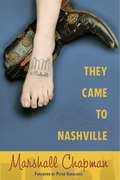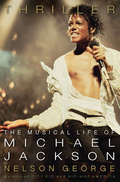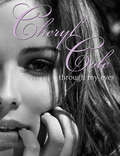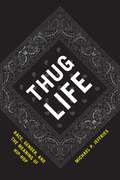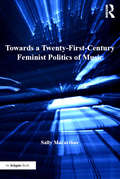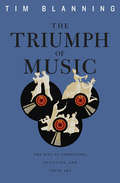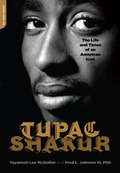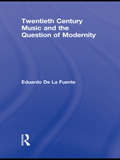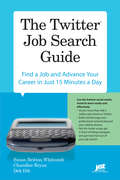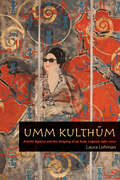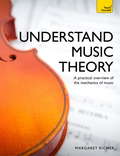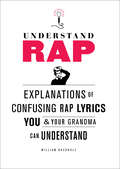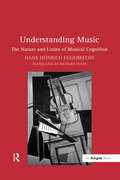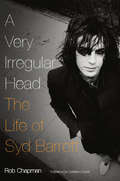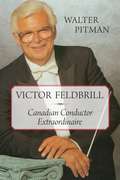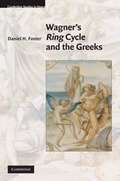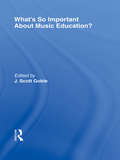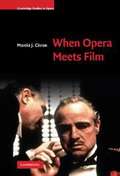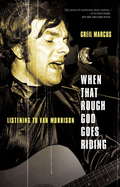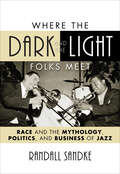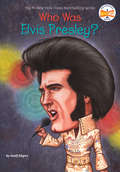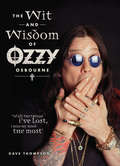- Table View
- List View
They Came to Nashville
by Marshall Chapman Peter GuralnickMarshall Chapman knows Nashville. A musician, songwriter, and author with nearly a dozen albums and a bestselling memoir under her belt, Chapman has lived and breathed Music City for over forty years. Her friendships with those who helped make Nashville one of the major forces in American music culture is unsurpassed. And in her new book, They Came to Nashville, the reader is invited to see Marshall Chapman as never before--as music journalist extraordinaire.In They Came to Nashville, Chapman records the personal stories of musicians shaping the modern history of music in Nashville, from the mouths of the musicians themselves. The trials, tribulations, and evolution of Music City are on display, as she sits down with influential figures like Kris Kristofferson, Emmylou Harris, and Miranda Lambert, and a dozen other top names, to record what brought each of them to Nashville and what inspired them to persevere. The book culminates in a hilarious and heroic attempt to find enough free time with Willie Nelson to get a proper interview. Instead, she's brought along on his raucous 2008 tour and winds up onstage in Beaumont, Texas singing "Good-Hearted Woman" with Willie.They Came to Nashville reveals the daily struggle facing newcomers to the music business, and the promise awaiting those willing to fight for the dream.Co-published with the Country Music Foundation Press
They Came to Nashville (Co-published with the Country Music Foundation Press)
by Marshall ChapmanMarshall Chapman knows Nashville. A musician, songwriter, and author with nearly a dozen albums and a bestselling memoir under her belt, Chapman has lived and breathed Music City for over forty years. Her friendships with those who helped make Nashville one of the major forces in American music culture are genuine and heartfelt, her insights unsurpassed. In her new book, They Came to Nashville, the reader is invited to see Marshall Chapman as never before: as music journalist extraordinaire. Here Chapman captures the personal stories of musicians who have shaped the modern history of music in Nashville, from the mouths of the artists themselves. Their tribulations and triumphs are revealed against the backdrop of a forever-evolving Music City, as Chapman sits down with icons like Kris Kristofferson and Emmylou Harris, new stars like Miranda Lambert, and a dozen other top names to ask what brought each of them to Nashville and what inspired them to persevere. The book culminates with Chapman's heroic and hilarious attempt to schedule a proper interview with original Outlaw Willie Nelson. Instead, she's brought along on Willie's raucous 2008 tour and winds up on stage with him in Beaumont, Texas, singing "Good Hearted Woman."They Came to Nashville reveals the daily struggles facing newcomers to the music business—and the promise awaiting those willing to fight for their dream.
Thriller: The Musical Life of Michael Jackson
by Nelson GeorgeThriller takes us back to a time in 1982 when Michael Jackson was king of the charts, breaking the color barrier on MTV, heralding the age of video, and becoming the ultimate representation of the crossover dreams of Motown’s Berry Gordy, who helped launch Jackson’s career with the Jackson 5. In this incisive and revealing examination of the making and meaning of Thriller, Nelson George illuminates the brilliant creative process (and work ethic) of Jackson and producer Quincy Jones, deftly exploring the larger context of the music, life, and seismic impact of Michael Jackson on three generations. All this from a groundbreaking journalist and cultural critic who was there. George questions whether the phenomenon Jackson became is even possible today. He revisits his early writings on the King of Pop and examines not only the stunning success of Thriller but also Jackson as an artist, public figure, and racial enigma-including the details surrounding his death on June 25, 2009.
Through My Eyes
by Cheryl ColeThrough My Eyes is the first official book from Cheryl Cole. Featuring a series of stunning exclusive new photos plus informal shots from her own personal collection, it gives us a unique glimpse into the life of our favourite star.From the recording studio in LA as she works on her debut album to backstage in Dublin on the opening night of her tour with the Black Eyed Peas, Cheryl shares with us some of her stand-out moments as a solo artist. We also explore the other elements of her stratospherically successful career as she takes us behind the scenes at The X Factor, into the world of L'Oreal, through the music industry's top awards ceremonies and into the windswept desert in California for a spectacular shoot under freezing conditions where we see her taking time off and enjoying rare moments of anonymity. Through the pictures that mean the most to her and their stories, which are told in her own words, Through My Eyes is a revealing and intimate portrait of the world of Cheryl Cole.
Thug Life: Race, Gender, and the Meaning of Hip-Hop
by Michael P. JeffriesHip-hop has come a long way from its origins in the Bronx in the 1970s, when rapping and DJing were just part of a lively, decidedly local scene that also venerated b-boying and graffiti. Now hip-hop is a global phenomenon and, in the United States, a massively successful corporate enterprise predominantly controlled and consumed by whites while the most prominent performers are black. How does this shift in racial dynamics affect our understanding of contemporary hip-hop, especially when the music perpetuates stereotypes of black men? Do black listeners interpret hip-hop differently from white fans? These questions have dogged hip-hop for decades, but unlike most pundits, Michael P. Jeffries finds answers by interviewing everyday people. Instead of turning to performers or media critics, " Thug Life" focuses on the musicOCOs fansOCoyoung men, both black and whiteOCoand the resulting account avoids romanticism, offering an unbiased examination of how hip-hop works in peopleOCOs daily lives. As Jeffries weaves the fansOCO voices together with his own sophisticated analysis, we are able to understand hip-hop as a tool listeners use to make sense of themselves and society as well as a rich, self-contained world containing politics and pleasure, virtue and vice. "
Towards a Twenty-First-Century Feminist Politics of Music
by Sally MacarthurTowards a Twenty-First-Century Feminist Politics of Music opens up a new way of thinking about the absence of women's music. It does not aim to find 'a solution' in a liberal feminist sense, but to discover new potentialities, new possibilities for thought and action. Sally Macarthur encourages us, with the assistance of Deleuze, and feminist-Deleuzian work, to begin the important work of imagining what else might be possible, not in order to provide answers but to open up the as yet unknown. The power of thought - or what Deleuze calls the 'virtual' - opens up new possibilities. Macarthur suggests that the future for women's 'new' music is not tied to the predictable and known but to futures beyond the already-known. Previous research concludes that women's music is virtually absent from the concert hall, and yet fails to find a way of changing this situation. Macarthur finds that the flaw in the recommendations flowing from past research is that it envisages the future from the standpoint of the present, and it relies on a set of pre-determined goals. It thus replicates the present reality, so reinforcing rather than changing the status quo. Macarthur challenges this thinking, and argues that this repetitive way of thinking is stuck in the present, unable to move forward. Macarthur situates her argument in the context of current dominant neoliberal thought and practice. She argues that women have generally not thrived in the neoliberal model of the composer, which envisages the composer as an individual, autonomous creator and entrepreneur. Successful female composers must work with this dominant, modernist aesthetic and exploit the image of the neo-romantic, entrepreneurial creator. This book sets out in contrast to develop a new conception of subjectivity that sows the seeds of a twenty-first-century feminist politics of music.
The Triumph of Music: The Rise of Composers, Musicians and Their Art
by Tim BlanningA distinguished historian chronicles the rise of music and musicians in the West from lowly balladeers to masters employed by fickle patrons, to the great composers of genius, to today’s rock stars. How, he asks, did music progress from subordinate status to its present position of supremacy among the creative arts? Mozart was literally booted out of the service of the Archbishop of Salzburg “with a kick to my arse,” as he expressed it. Yet, less than a hundred years later, Europe’s most powerful ruler—Emperor William I of Germany—paid homage to Wagner by traveling to Bayreuth to attend the debut of The Ring. Today Bono, who was touted as the next president of the World Bank in 2006, travels the world, advising politicians—and they seem to listen. The path to fame and independence began when new instruments allowed musicians to showcase their creativity, and music publishing allowed masterworks to be performed widely in concert halls erected to accommodate growing public interest. No longer merely an instrument to celebrate the greater glory of a reigning sovereign or Supreme Being, music was, by the nineteenth century, to be worshipped in its own right. In the twentieth century, new technological, social, and spatial forces combined to make music ever more popular and ubiquitous. In a concluding chapter, Tim Blanning considers music in conjunction with nationalism, race, and sex. Although not always in step, music, society, and politics, he shows, march in the same direction.
Tupac Shakur: The Life and Times of an American Icon
by Tayannah Lee Mcquillar Fred L. JohnsonA passionate, critically incisive biography of one of the most influential rappers of all time, Tupac Shakur, and how he came to dominate hip-hop in the 1990s
Twentieth Century Music and the Question of Modernity (Routledge Advances in Sociology)
by Eduardo de la FuenteIn the first decade of the twentieth-century, many composers rejected the principles of tonality and regular beat. This signaled a dramatic challenge to the rationalist and linear conceptions of music that had existed in the West since the Renaissance. The ‘break with tonality’, Neo-Classicism, serialism, chance, minimalism and the return of the ‘sacred’ in music, are explored in this book for what they tell us about the condition of modernity. Modernity is here treated as a complex social and cultural formation, in which mythology, narrative, and the desire for ‘re-enchantment’ have not completely disappeared. Through an analysis of Schoenberg, Stravinsky, Boulez and Cage, 'the author shows that the twentieth century composer often adopted an artistic personality akin to Max Weber’s religious types of the prophet and priest, ascetic and mystic. Twentieth Century Music and the Question of Modernity advances a cultural sociology of modernity and shows that twentieth century musical culture often involved the adoption of ‘apocalyptic’ temporal narratives, a commitment to ‘musical revolution’, a desire to explore the limits of noise and sound, and, finally, redemption through the rediscovery of tonality. This book is essential reading for those interested in cultural sociology, sociological theory, music history, and modernity/modernism studies.
The Twitter Job Search Guide
by Susan Whitcomb Chandlee Bryan Deb DibThis groundbreaking book, from three leading career experts, shows readers how they can gain momentum in their job searches and careers through "tweets" that consist of fewer characters than a standard text message. Readers learn how to exponentially increase the size of their personal and professional networks by exchanging ideas, demonstrating subject-matter expertise, enhancing their reputation, and developing a "fan club."
Umm Kulthum: Artistic Agency and the Shaping of an Arab Legend, 1967-2007 (Music Culture)
by Laura LohmanIn 1967 Egypt and the Arab world suffered a devastating defeat by Israel in the Six-Day War. Though long past the age at which most singers would have retired, the sexagenarian Egyptian singer Umm Kulthum launched a multifaceted response to the defeat that not only sustained her career, but also expanded her international fame and shaped her legacy. By examining biographies, dramas, monuments, radio programming practices, and recent recordings, Laura Lohman delves into Umm Kulthum's role in fashioning her image and the conflicting ways that her image and music have been interpreted since her death in 1975.
Understand Music Theory: Teach Yourself (Teach Yourself Music Ser.)
by Margaret RicherUnderstand Music Theory offers a practical approach which uses active learning to impart knowledge. Suitable for complete beginners and assuming no previous experience, each chapter includes diagrams, examples, clear explanations, helpful hints and self-tests before moving on, which help create a sense of achievement as you make your way through the book. With results that will get you enjoying your music even more, this is an invaluable guide to understanding music theory.NOT GOT MUCH TIME?One, five and ten-minute introductions to key principles to get you started.AUTHOR INSIGHTSLots of instant help with common problems and quick tips for success, based on the authors' many years of experience.TEST YOURSELFTests in the book and online to keep track of your progress.EXTEND YOUR KNOWLEDGEExtra online articles at www.teachyourself.com to give you a richer understanding of music theory.FIVE THINGS TO REMEMBERQuick refreshers to help you remember the key facts.TRY THISInnovative exercises illustrate what you've learnt and how to use it.
Understand Rap: Explanations of Confusing Rap Lyrics that You & Your Grandma Can Understand
by William BuckholzTongue-in-cheek translations of rap lyrics for the clueless!Rap songs are famous for their double entendres, clever turns of phrase, and general ingenuity, but that doesn’t mean things always make sense the first time around. Enter Understand Rap, a funny pop-cultural reference based on the website of the same name, which dryly and precisely explains the confusing lyrics and terms used in rap songs—in language that even the most unhip person can understand! “Where has this book been all our lives?” —Geek Alerts
Understanding Mozart's Piano Sonatas
by John IrvingMozart's piano sonatas are among the most familiar of his works and stand alongside those of Haydn and Beethoven as staples of the pianist's repertoire. In this study, John Irving looks at a wide selection of contextual situations for Mozart's sonatas, focusing on the variety of ways in which they assume identities and achieve meanings. In particular, the book seeks to establish the provisionality of the sonatas' notated texts, suggesting that the texts are not so much identifiers as possibilities and that their identity resides in the usage. Close attention is paid to reception matters, analytical approaches, organology, the role of autograph manuscripts, early editions and editors, and aspects of historical performance practice - all of which go beyond the texts in opening windows onto Mozart's sonatas. Treating the sonatas collectively as a repertoire, rather than as individual works, the book surveys broad thematic issues such as the role of historical writing about music in defining a generic space for Mozart's sonatas, their construction within pedagogical traditions, the significance of sound as opposed to sight in these works (and in particular their sound on fortepianos of the later eighteenth-century) , and the creative role of the performer in their representation beyond the frame of the text. Drawing together and synthesizing this wealth of material, Irving provides an invaluable reference source for those already familiar with this repertoire.
Understanding Music: The Nature and Limits of Musical Cognition
by HansHeinrich EggebrechtIn an age when our patterns of music consumption are changing rapidly, musical understanding has never been more relevant. Understanding Music provides readers with an ideal entry point to the topic, addressing 'both the music lover who has made listening to music an important part of his life and at the same time is willing to reflect on music and his encounter with it, as well as the more academically-minded enthusiast and the thoughtful expert.' Its author, Hans Heinrich Eggebrecht, was one of the most influential German musicologists of the twentieth century and yet he is almost unknown to English readers. His published work stretches from one end of the musicological spectrum to the other, with research on historical topics in early music, Bach, Beethoven reception, Mahler and music aesthetics all featuring. Understanding Music summarizes Eggebrecht's thoughts on the relationship between music and cognition. As he says in his preface, the purpose of his book is 'to direct the reader towards the fundamental issues and processes implied in understanding music. What does understanding mean when applied to music? How is the process to be described? What different kinds of understanding are to be distinguished here? What other concepts are implicit in and related to the concept of understanding? How is the relationship between music and the listener who understands it to be articulated? What might correct understanding of music mean given music's multiplicity of meaning and effect? Where are the limits of understanding and what lies beyond? What role do language and history play?'. Eggebrecht's answers to these and other questions amount to a compelling account of how the mind grasps the sounds of music in themselves and what other factors contribute to music's meaning so much to us as listeners.
A Very Irregular Head: The Life of Syd Barrett
by Rob ChapmanSyd Barrett was the lead guitarist, vocalist, and principle songwriter in the original line up of Pink Floyd. During his brief time with the band (1966-68) he was the driving force behind the unit. After he left the band he made just two further solo albums which were both released in 1970, before withdrawing from public view to lead a quiet, and occasionally troubled life in Cambridge, the town of his birth. Rob Chapman's book will be the first authoritative and exhaustively researched biography of Syd Barrett that fully celebrates his life and legacy as a musician, lyricist and artist, and which highlights the influence that he continues to have over contemporary bands and music fans alike.
Victor Feldbrill: Canadian Conductor Extraordinaire
by Walter PitmanVictor Feldbrill is an account of the life and cultural contribution of one of Canada’s most talented conductors. Born in 1924, he made his Toronto Symphony conducting debut at 18. He went on to become the artistic director of the Winnipeg Symphony, a conductor with the Toronto Symphony, and a guest conductor of virtually every major symphony orchestra in Canada. Feldbrill was also the first conductor-in-residence at the University of Toronto’s Faculty of Music from 1968 to 1982. However, what really set Feldbrill apart was his limitless enthusiasm and support of Canadian music and young musicians, as well as his insistence on playing the music of Canadian composers despite the reluctance of some orchestral managers and the initial opposition of audiences at the time. In doing so he reached out to young people and trained many to take their places as members of Canadian orchestras from coast to coast.
Wagner's Ring Cycle and the Greeks
by Daniel H. FosterVolumes for Cambridge Studies in Opera explore the cultural, political, and social influences of the genre. As a cultural art form, opera is not produced in a vacuum. Rather, it is influenced, whether directly or in more subtle ways, by its social and political environment. In turn, opera leaves its mark on society and contributes to shaping the cultural climate.
What's So Important About Music Education? (Routledge Research in Education)
by J. Scott GobleWhat’s So Important About Music Education? presents a new philosophy of music education for the United States, rooted in history and current perspectives from ethnomusicology. J. Scott Goble explores the societal effects of the nation's foundations in democracy and capitalism, the constitutional separation of church and state, and the rise of recording, broadcast, and computer technologies. He shows how these and other factors have brought about changes in the ways music teachers and concerned others have conceptualized music and its importance in education. In demonstrating how many of the personal and societal benefits of musical engagement have come to be obscured in the nation’s increasingly diverse public forum, Goble argues for the importance of musical engagement in human life and for the importance of music in education. An ideal text for courses in music education foundations, the book concludes with recommendations for teaching the musical practices of the nation's cultural communities in schools in terms of their respective cultural meanings.
When Opera Meets Film
by Marcia J. CitronOpera can reveal something fundamental about a film, and film can do the same for an opera, argues Marcia J. Citron. Structured by the categories of Style, Subjectivity, and Desire, this volume advances our understanding of the aesthetics of the opera/film encounter. Case studies of a diverse array of important repertoire including mainstream film, opera-film, and postmodernist pastiche are presented. Citron uses Werner Wolf's theory of intermediality to probe the roles of opera and film when they combine. The book also refines and expands film-music functions, and details the impact of an opera's musical style on the meaning of a film. Drawing on cinematic traditions of Hollywood, France, and Britain, the study explores Coppola's Godfather trilogy, Jewison's Moonstruck, Nichols's Closer, Chabrol's La C_r_monie, Schlesinger's Sunday, Bloody Sunday, Boyd's Aria, and Ponnelle's opera-films.
When That Rough God Goes Riding: Listening to Van Morrison
by Greil Marcus"Van Morrison," says Greil Marcus, "remains a singer who can be compared to no other in the history of modern popular music. " When Astral Weeks was released in 1968, it was largely ignored.<P><P> When it was rereleased as a live album in 2009 it reached the top of the Billboard charts, a first for any Van Morrison recording. The wild swings in the music, mirroring the swings in Morrison's success and in people's appreciation (or lack of it) of his music, make Van Morrison one of the most perplexing and mysterious figures in popular modern music, and a perfect subject for the wise and insightful scrutiny of Greil Marcus, one of America's most dedicated cultural critics. This book is Marcus's quest to understand Van Morrison's particular genius through the extraordinary and unclassifiable moments in his long career, beginning in 1965 and continuing in full force to this day. In these dislocations Marcus finds the singer on his own artistic quest precisely to reach some extreme musical threshold, the moments that are not enclosed by the will or the intention of the performer but which somehow emerge at the limits of the musician and his song.
Where the Dark and the Light Folks Meet: Race and the Mythology, Politics, and Business of Jazz (Studies in Jazz)
by Randall SandkeWhere the Dark and the Light Folks Meet tackles a controversial question: Is jazz the product of an insulated African-American environment, shut off from the rest of society by strictures of segregation and discrimination, or is it more properly understood as the juncture of a wide variety of influences under the broader umbrella of American culture? This book does not question that jazz was created and largely driven by African Americans, but rather posits that black culture has been more open to outside influences than most commentators are likely to admit. The majority of jazz writers, past and present, have embraced an exclusionary viewpoint. Where the Dark and the Light Folks Meet begins by looking at many of these writers, from the birth of jazz history up to the present day, to see how and why their views have strayed from the historical record. This book challenges many widely held beliefs regarding the history and nature of jazz in an attempt to free jazz of the socio-political baggage that has s
Who Is The Greatest: Elvis Or The Beatles
by Mike Shellans Bill SlaterMike Shellans and Bill Slater have come together in their life-long interests in Elvis and The Beatles to create the first comparison of these influential Pop icons. Who is the Greatest: Elvis or The Beatles? is a relevant and engaging textbook for a Music History or Popular Culture survey course. It provides a wealth of information and context about the music, lives, and careers of Elvis and The Beatles.
Who Was Elvis Presley? (Who Was?)
by John O'Brien Geoff EdgersPut on your blue suede shoes and get ready for another addition to the Who Was…? series! The King could not have come from humbler origins: Born in Tupelo, Mississippi, during the Depression, he grew up with the blues music of the rural South, the gospel music of local churches, and the country-western classics. But he forged a sound all his own—and a look that was all his own, too. With curled lip, swiveling hips, and greased pompadour, Elvis changed popular music forever, ushering in the age of rock and roll. Geoff Edgers’s fascinating biography of this icon of American pop culture includes black and- white illustrations on nearly every spread.
The Wit and Wisdom of Ozzy Osbourne
by Dave ThompsonAll Aboard the Crazy TrainThis is Ozzy Osbourne in all his raw and unfiltered glory; four decades worth of his best quotes, oddest observations, risqué retorts, and yes, even articulate ponderings. Ozzy might come across as a nutter (and rightly so), but when you sit down and seriously consider what he's saying . . . well, he's f**king Ozzy Osbourne and he's got things to say!The Prince of Darkness sounds off on various topics including:Black Sabbath: "We thought, Let's scare the whole f**king planet with music."Drugs and Alcohol: "I was always a miserable drunk."Rehab: "I still take medication, but not for fun."Himself: "I don't know who Ozzy is. I wake up a new person every day."The Wit & Wisdom of Ozzy Osbourne reveals Ozzy's philosophy of life and reflects the spirit of the man who made Black Sabbath famous, Christian groups frightened, and The Osbournes–a hit reality TV show.
